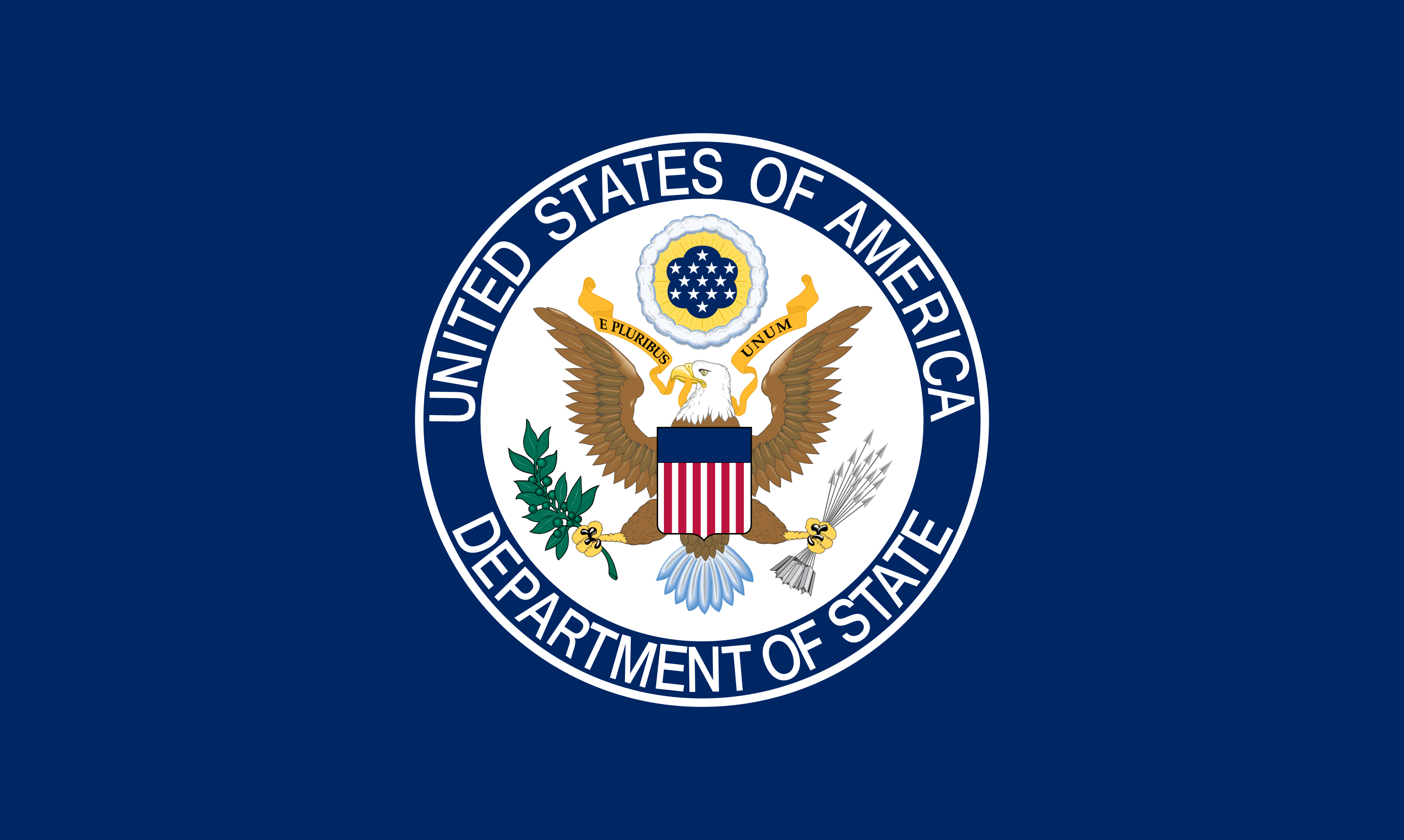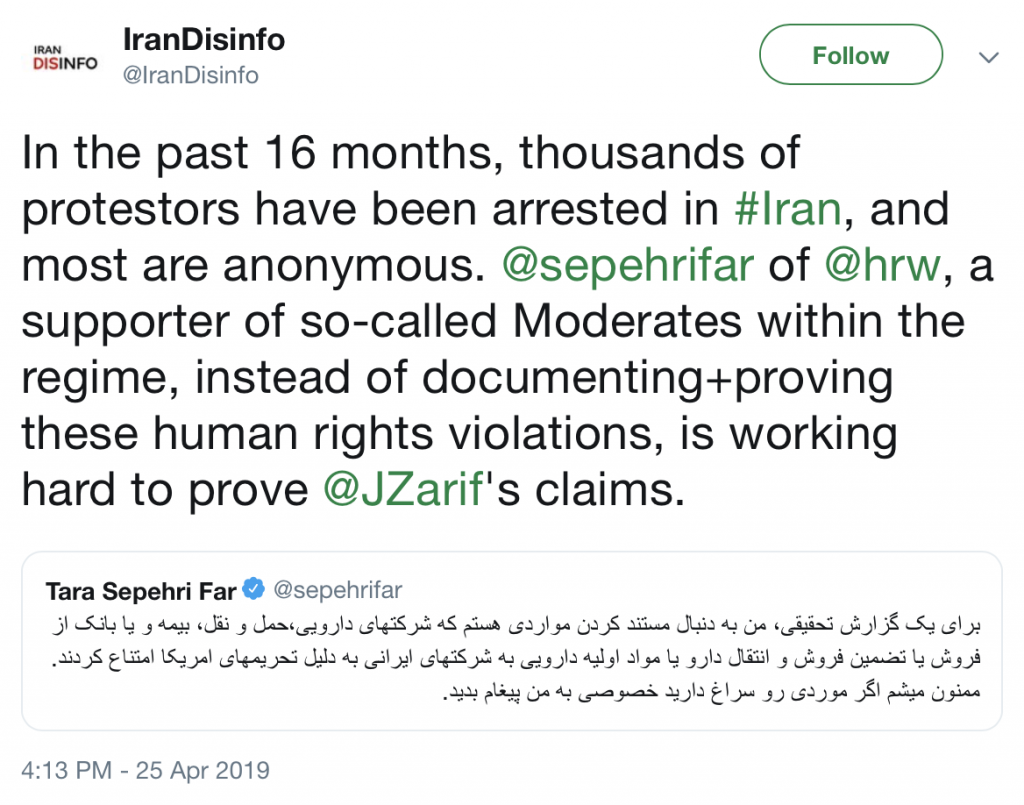Is The State Department Funding Attacks On Activists?

Considerable evidence emerged late this week connecting the U.S. State Department to a Twitter account that has engaged in online attacks against human rights organizations, Iranian-American activists, journalists, and others advocating against the escalation of tensions between the United States and Iran. The revelation is raising questions about whether the Trump administration is using federal funds to propagandize in favor of a potential Iran war.
The story began to develop on Thursday, when Sarah Leah Whitson, Human Rights Watch’s executive director for the Middle East and North Africa, flagged a tweet made last month by the “Iran Disinformation Project” (@IranDisinfo):
“This is a US State Department funded account,” Whitson tweeted. Journalist Negar Mortazavi followed up, tweeting, “so the State Department uses taxpayer money to fund online attacks on HRW because the organization is researching the human cost of US sanctions in Iran. Is this even legal?”
That the “Iran Disinformation Project” is State Department-funded is unquestionably true. The organization’s own “About Us” webpage reads as follows (emphasis added):
Iran Disinformation Project exposes and counters the nefarious influence of one of the world’s few remaining totalitarian regimes. Daily in Persian, Arabic and English languages, the initiative brings to light disinformation emanating from the Islamic Republic of Iran via official rhetoric, state propaganda outlets, social media manipulation and more.We provide near real time counter narratives and truth telling through our social networks as well as longer, investigative reports. Iran Disinformation Project’s documentaries and other video productions, profiles of disinformation nodes and personalities, translations of scholarly works on disinformation and more provide to Iranian, Arab and international audiences an educative perspective on how Ayatollah Khamenei’s theocracy ensures regime survival not only through aggression but also through the soft power of its lies about itself, about Iran and about our world. The regime’s external terror, imperial wars and financial power are a focus, as are its internal repression, corruption and incompetence. Throughout our work, we amplify the voices and civic actions of courageous Iranians who reveal the regime for the evil it truly is.Iran Disinformation Project was launched in late 2018 and is funded by the US Department of State’s Global Engagement Center.
The target of the project’s April tweet, HRW researcher Tara Sepehri Far, expressed some dismay that the Iran Disinformation Project’s attack on her was at least in part financed with taxpayer money:
By late Friday, presumably embarrassed by the attention the Iran Disinformation Project was suddenly attracting, the State Department suspended its funding. NPR journalist Michele Keleman reported that the department is requiring “the implementer” to take “necessary steps to ensure that any future activity remains within the agreed scope of work.” But questions remain. What is that “agreed scope of work”? Who is “the implementer” behind the project? How long has the State Department been aware that the project was using public funds to attack, repeatedly, journalists and human rights activists for propagandistic purposes? And perhaps most importantly, did anyone in the Trump administration direct the project to conduct those attacks?
So far, the State Department has offered no clarification about its relationship with the Iran Disinformation Project or the type of work it had been funding the project to carry out. But evidence has surfaced suggesting it may be linked to one of the most prominent Iran hawk think tanks in Washington. As highlighted by LobeLog contributing editor Eli Clifton, one of the project’s main researchers appears to be Saeed Ghasseminejad, the “Senior Iran and Financial Economics Advisor” at the Foundation for Defense of Democracies (FDD). His writings for the project are featured on FDD’s website. FDD’s rolein shaping the debate on Iran in DC and in hyping concerns about Iran in the mainstream press is clear, as is its institutional preference for a U.S.-Iran military conflict. Its close ties to the Trump administration are similarly well-attested.
Additional evidence appears to show that the Iran Disinformation Project is being operated in connection with Tavaana, an organization established in 2010, using State Department seed money, to help build Iranian civil society primarily using distance learning technologies. Tavaana’s co-founder, Mariam Memarsadeghi, highlights an unspecified connection to the Iran Disinformation Project in her Twitter bio.
Without more information on the intended scope of the Iran Disinformation Project’s work, it is impossible to say whether its State Department funding was legally (or ethically) justifiable. But as former Deputy Assistant Secretary of State for Legislative Affairs Joel Rubin noted, “We American taxpayers don’t fund our government to attack our fellow citizens. If there was any direction given by State Dept officials to the grantee – which Americans to target, what message to use or even just a nod of approval – then we have a scandal.”
Is the Trump administration funneling public funds to organizations dedicated to regime change in Tehran? Are those organizations using those funds to impugn their ideological adversaries online? Has anybody in the Trump administration directed those organizations to undertake such attacks? Given that the funds in question are public, the State Department owes U.S. taxpayers a fuller explanation as to how their money is being spent.



0 Comments:
Post a Comment
Subscribe to Post Comments [Atom]
<< Home